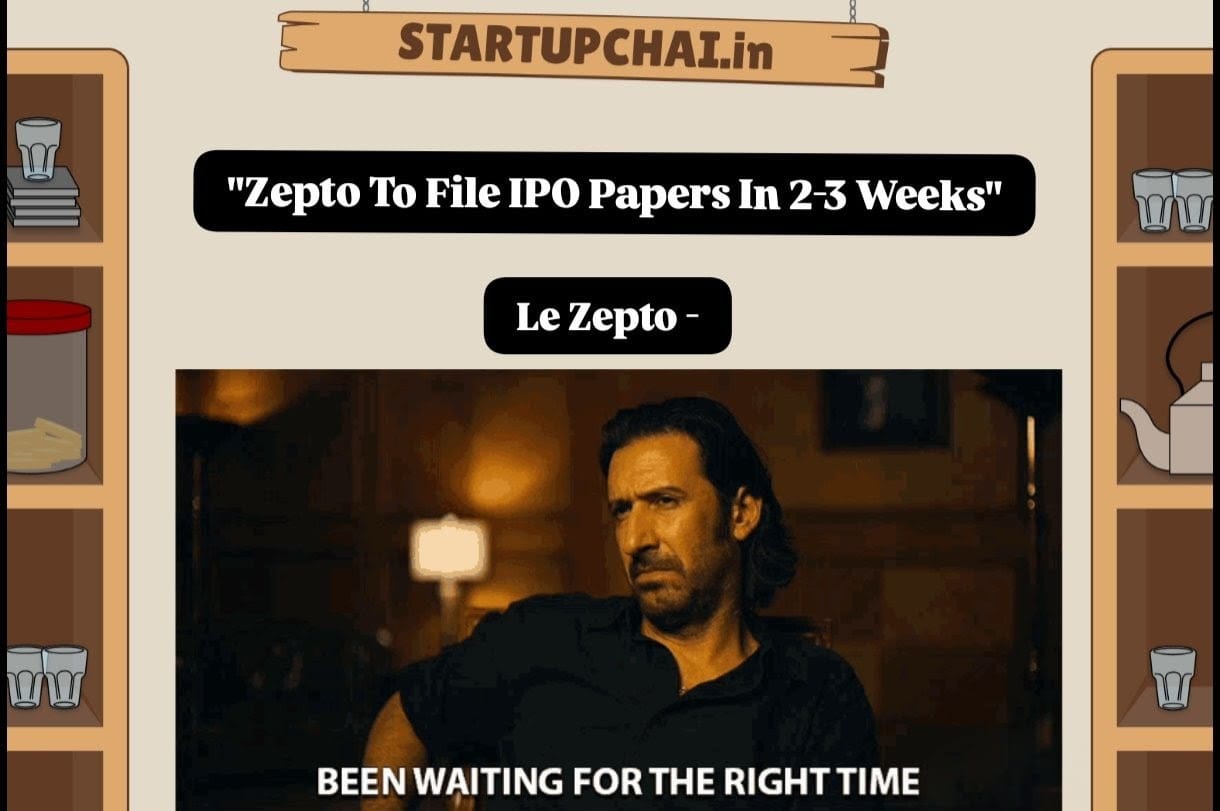- Startup Chai
- Posts
- India’s Self-Funded Future, NVIDIA Joins Alliance, and Zepto’s IPO Dreams
India’s Self-Funded Future, NVIDIA Joins Alliance, and Zepto’s IPO Dreams
Plus Aakash CFO Vipan Joshi Quits, and fundraising news about BabyOrgano, Spacewood Furnishers, and MoEngage

India’s startup story has long been fuelled by foreign money. Global funds set the pace, boards chased Western benchmarks, and exits were designed for New York, not Mumbai. That model worked until it didn’t. The funding winter exposed a structural truth: India built a world-class startup machine on someone else’s fuel. Now the real question is - can India fund India?
The government clearly thinks so. Commerce Minister Piyush Goyal has been pushing to channel long-term domestic savings - pension, provident, and insurance money - into venture capital. The logic is simple: India’s institutional savings pool exceeds ₹80 lakh crore, yet only a fraction touches startups because of conservative exposure caps. Even a 1% shift could unlock tens of thousands of crores - enough to change the venture landscape.
This move is already shaping behaviour. Startups that once registered abroad are now reverse-flipping to India as the domestic IPO market matures. Public investors are rewarding companies that show profit, not just GMV. It’s not idealism, it’s realism. Domestic capital is slower but steadier, and it changes power equations on the cap table. Founders negotiating with Indian LPs aren’t chasing global macro cycles - they’re aligned with local ones.
Of course, the caution is justified. Pension fund managers aren’t chasing unicorns; they manage retirements. They fear illiquidity and opacity, and one bad bet makes headlines. That’s why rules today - strict AIF limits, high minimum sizes, and bans on leverage - make sense. But if India wants a deeper venture market, the plumbing must evolve. The idea of tokenized asset reserves linked to sovereign bonds could be one answer - combining safety with flexibility, allowing regulated money to trickle into innovation without spooking risk officers.
Meanwhile, the market is learning discipline the hard way. Porter cut 18% of its workforce to hit profitability before its IPO. Zepto increased Indian ownership and cleaned up its structure to reduce governance friction. Both moves show how startups are adapting to local investors who value predictability over hype.
But the ecosystem also needs scale. Can the domestic market absorb large IPOs? Possibly, if institutional players participate meaningfully. Retail enthusiasm can’t carry ₹10,000-crore offers alone. SEBI’s ongoing tweaks to anchor allocations and mutual fund quotas are small but vital steps. Without pensions and insurers at the table, India’s tech listing pipeline will remain narrow.
Domestic money won’t necessarily be smarter - just different. It bargains harder, demands quarterly clarity, and rewards founders who show unit economics and CAC payback, not story slides. To attract it, India needs more transparency - mandatory fund metrics (NAV, DPI, TVPI) for any vehicle tapping public savings, and a limited-liquidity window for AIF units so CIOs can exit responsibly.
The rewards of this transition are huge. A rupee-funded ecosystem recycles wealth locally, stabilises valuations, and builds a culture of sustainable growth. Every exit that pays Indian LPs creates more domestic investors for the next generation. Over time, this makes India less dependent on global cycles and more confident in pricing its own innovation.
There are trade-offs, of course. Domestic money may prefer late-stage or steady-growth bets, leaving frontier tech to global capital. That’s fine. The goal isn’t isolation, it’s balance. Keep foreign funds for scale and networks, but build a rupee backbone that doesn’t buckle every time the Fed sneezes.
For founders, the lesson is clear: clean up your cap table, add domestic investors, and build real governance before you file your DRHP. For regulators: test a 1% pension allocation to proven venture managers and make it transparent. For insurers: start small, but start.
India spent a decade building unicorns on imported oxygen. The next decade must prove we can breathe on our own. Domestic capital won’t make startups invincible, but it will make them independent. And that’s the difference between a funding cycle and a foundation.
Let’s go through what else is happening in Indian startup world - Grab your simmering cup of StartupChai.in and unwind with our hand-brewed memes.

“Suno Gaur Se Duniya Walo”: NVIDIA Joins India Deep Tech Alliance As Founding Member
NVIDIA has joined India’s $2 billion Deep Tech Alliance as a founding member, giving a major boost to the country’s AI ecosystem.
The company will mentor and train emerging startups, helping shape the next wave of deep tech innovation. With a Global AI Summit planned for 2026, India’s artificial intelligence ambitions are moving from vision to velocity.
Read more here

“It’s The Time To Disco”: Zepto To File IPO Papers In 2-3 Weeks
Zepto is gearing up to go public, with plans to file its IPO papers in the next few weeks through SEBI’s confidential route.
The quick-commerce unicorn aims to raise up to $500 million and offer an exit to early backers. If all goes as planned, your next grocery delivery might come from a soon-to-be-listed company by mid-2026.
Read more here


“Suswagatam Suswagatam”: Tesla Ropes In Ex-Lamborghini Country Head Sharad Agarwal To Lead India Ops
Tesla has found its new India driver in Sharad Agarwal, the former Lamborghini India head, who’s now steering the EV giant’s local operations.
Agarwal joins from Mahindra-backed Classic Legends, bringing a mix of speed and strategy to Tesla’s India plans. His appointment comes six months after Prashanth Menon’s exit, signaling Tesla’s renewed push to hit the Indian roads.
Read more here
“Jaa Rahe Ho Jane Jana”: Aakash CFO Vipan Joshi Quits After 9-Year Stint
After nine years with Aakash, CFO Vipan Joshi has called it a day, marking another leadership shake-up at the edtech giant.
A chartered accountant by training, Joshi earlier held key roles at Vulcan Express and Blinkit. His exit follows recent top-level changes and a major capital boost, as Aakash readies itself for its next big growth chapter.
Read more here

BabyOrgano has secured INR 20 crore in a round led by RPSG Capital Ventures to ramp up product innovation and marketing. The Ayurvedic kids’ wellness brand will use the funds to expand its operations and strengthen its growing portfolio.
Read more here
Spacewood Furnishers has raised Rs 300 crore from A91 Partners at a Rs 1,200 crore valuation to fuel its next growth phase. The modular furniture maker aims to scale from 35 to 100 exclusive stores across India while strengthening its brand and operations.
Read more hereChrysCapital has closed its $2.2 billion Fund X, marking the largest-ever raise by an India-focused private equity firm. The new fund, 60% larger than its predecessor, will back established players across consumer, healthcare, and tech sectors.
Read more hereMoEngage has raised $100 million from Goldman Sachs Alternatives and A91 Partners to supercharge its Merlin AI suite and global expansion. The fresh funding will also strengthen its North America and EMEA teams as the SaaS startup crosses $250 million in total capital raised.
Read more hereKshema Insurance has secured $20 million from the Paris Agreement’s Green Climate Fund to scale its climate-resilient crop coverage. The investment, GCF’s first in a micro-insurance solution, aims to safeguard India’s smallholder farmers from climate-induced losses.
Read more here
How did today's serving of StartupChai fare on your taste buds? |